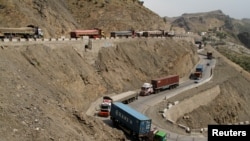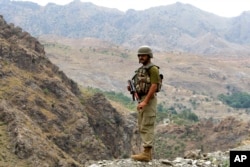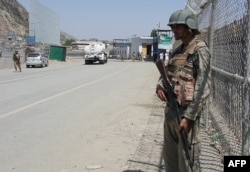Pakistan, in talks with Afghanistan, has reiterated that “effective management” of their shared border is vital for efforts aimed at countering terrorism, promoting peace and strengthening bilateral relations.
A six-member Afghan delegation led by Deputy Foreign Minister Hekmat Khalil Karzai visited Islamabad Monday for talks with Pakistani counterparts.
The meeting followed days of deadly clashes provoked by Pakistan’s construction of a new gate at the busy Torkham crossing with Afghanistan.
Cordial talks
The talks between the delegations were held in a "cordial atmosphere marked by a mutual desire to amicably resolve border-related issues," a Pakistani Foreign Ministry statement said after the Islamabad meeting.
"Both sides decided to work in the spirit of good neighborly relations and friendly cooperation between the two countries," it said, adding the discussions will be furthered when senior Afghan and Pakistani officials meet again on the sidelines of a regional summit later this week.
“During the discussions, it was emphasized that there was a need for creating a suitable mechanism for consultation on border management issues,” the announcement said.
The exchange of fire between Afghan and Pakistani forces that erupted a week ago left four soldiers dead and wounded more than 40 others, including civilians, on both sides before the two sides declared a cease-fire on Thursday.
A border closure had stranded thousands of Afghans on both sides and halted truck convoys carrying essential commodities and goods to landlocked Afghanistan.
Kabul opposes fencing or the building of permanent structures along the 2,600-kilometer border with Pakistan because it does not recognize the demarcation called the Durand Line drawn by former British rulers of the Indian subcontinent.
The Afghan Foreign Ministry, in a separate statement, said that Karzai raised what it alleged were “various violations” by Pakistan, including the building of installations and checkpoints inside Afghan territory. “Moreover, he strongly protested against Pakistan’s ongoing unprovoked artillery shelling of Afghan villages.”
The border dispute is at the heart of bilateral tensions. Pakistan this month for the first time in decades introduced strict monitoring of thousands of Afghans who travel across the border daily, allowing entry and exit only to those with valid travel documents.







